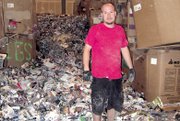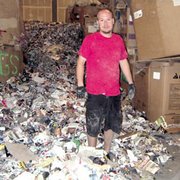The Greening of Las Vegas
Zachary Delbex-Smith is on a mission to green the trade show industry’s capital.
Zachary Delbex-Smith has stood before mounds of paper so vast and apocalyptic they looked as though they’d been scattered by a bomb. In fact, they were scattered by a trade show in Las Vegas.
All the paper could have been recycled, but it wasn’t.
Trade shows and conventions represent the second most wasteful industry in the United States, according to the U.S. Environmental Protection Agency, and Las Vegas is the world’s trade show capital. Delbex-Smith, who has spent the past six years working 150 shows a year in the Teamsters Union, has had a front-row seat to the cringe-inducing amounts of waste generated in Las Vegas.
And so the 25-year-old set about doing something about it. Last August, Delbex-Smith founded Greener Vegas (www.greenervegas.org), a consultancy and referral service to help trade shows clean up responsibly.
Over the past year, while working full time, Delbex-Smith has helped recycle 415,000 pounds of paper and forged partnerships with many of the leading trade shows held in Las Vegas, including the Off-Price Specialist Show and the MAGIC Marketplace. Greener Vegas has applied for nonprofit status and is currently awaiting application approval.
California Apparel News recently caught up with Delbex-Smith to discuss the waste he has seen and what he—and we all—can do to help eliminate “Sin City’s” capital sin against the environment.
California Apparel News: How did Greener Vegas begin?Zachary Delbex-Smith: For the past six years, as part of my daily routine, I deal with the heads of all the associations for the conventions that come to town. I’d be responsible for putting out all their magazines and brochures, and all the time I was throwing them away.
I was raised poor in Hawaii, one of seven kids on welfare. We were taught “Waste not, want not.” So seeing the continuous waste of the convention industry—it’s the most wasteful industry there is.
Our service is basically free; we just want to prevent these materials from going into a landfill but also make it simple and streamlined. The Las Vegas Convention Center has this off-source collecting and sorting, but that means an entire other step of trash hauling and re-separating what’s already been separated. These publications that we pick up are already on pallets shrunk-wrapped together, and they can be streamlined right to the recycling center; [we can] give you credit [on the Greener Vegas Web site] and cut down your carbon footprint.
We’re trying to make it a win-win situation, but people in these industries are so busy, and at most points don’t have time for somebody like me or even want to hear what we have to say.
CAN: What is the main source of trade show waste?ZD-S: Publications that were brought in to be distributed [that] were left over. And there’s just no outbound shipping for those materials, meaning no one’s responsible to come pick it up. I worked the CTIA Wireless show a few years ago and was personally responsible for throwing away 64,000 pounds of trash.
We have this National Hardware Show coming up, and they have this huge Chinese pavilion. At the end of the last show, I walked out and saw these giant street lamps going into the trash. That must be $500 to $1,000 for each lamp, and they’re just being thrown away because nobody knows somebody who could use them.
There are also exhibit halls set up just for dinner, with 3,000 people at a company venue, and, at the end, everything just gets thrown away and is not even considered to be taken to the pig farm where they feed pigs hotel food.
These associations are so massive; it’s hard for them to just go green overnight. Green wasn’t a focus when we first started, but now that the wave has come, it’s catching on and you’re hearing about it more. Since these associations are the heads of industries, we thought they would be the perfect market because they, in turn, could teach so many people.
CAN: How do fashion trade shows compare to other industries’ shows?ZD-S: Pooltradeshow is such an advanced convention because it is so beyond most people’s thinking of what green is. We learned a lot from them. Their show space had everything from bamboo floors to wall panels that were designed into the functionality of the show.
But trade shows are becoming more recycling-conscious, with an off-site separation of their materials. The problem is a lack of current information, so that’s what our Web site provides. And during trade shows, we find exhibitors who are doing something green and write about it for our Web site.
Every show is a little bit different. For [one trade show], we were able to reuse 36 tons of rock that they put down as visual landscaping.
CAN: You mean they were going to leave it behind?ZD-S: They didn’t know what they were going to do.
CAN: Shows aren’t planning these things in advance?ZD-S: It’s not that they’re not planning; it’s that there’s nobody available or willing to do the service. We’re trying to create an industry by being someone who’s willing to come in and network these usable products into something other than trash. It’s more of a time constraint rather than that nobody wants the product. These shows move in and out in a matter of two weeks, and to find somebody on the spot who needs 36 tons of rock is hard to do.
From what I’ve seen, shows don’t consider hanging signs and banners as recyclable. I’m talking about the signs that say “Aisle 200.” Those are on every aisle.
CAN: Shows don’t keep those because the numbers always change?ZD-S: Or because every year the logo’s different. Also, storage is going to be a couple hundred dollars, and for that you can just reprint it. It’s lack of space, lack of time. And since warehousing costs so much, what’s it worth?
But those signs are reusable if you find the right vendor. In New York and Long Beach [Calif.] they have these chemical plants that take in Sintra, which the trade show industry uses a lot. It’s basically flat PVC piping, and it’s highly horrible for the environment. There’s a company in New York that will take all the Sintra I can get, and they break it down into beads, which a company in Canada then makes into PVC piping.
There are a thousand other things I’d like to take off the show floor, but so much is required to orchestrate it. We’re trying to lay a ground base so people will know who we are. When we get nonprofit status, recyclable donations will fund our organization and be a tax write-off.
CAN: What are some of your other pet peeves?ZD-S: Those little plastic show badges add up. I think our math found that 500,000 pounds of plastic badges are used in Vegas every year.
So we’re trying to launch a badge-recycling program that would allow a green-minded exhibitor to partner with us and the sponsoring trade association to advertise the association’s going green, as well as give the exhibitor advertising in prime locations of the show. There would be kiosks with advertising that say, “Please drop your badges here.”
CAN: Tell us about your work with the Off-Price Specialist Show.ZD-S: The show in February was run with an eco-friendly focus, and Greener Vegas worked with them on recycling publications and badges.
We would like to commend them for their conscious effort to reduce the amount of wasted publications. About 1,225 pounds of paper, plastic and cardboard were recycled directly from the convention floor and “green streamlined” to the recycling center. The Off-Price Specialist Show has also committed to an ongoing relationship as a Greener Vegas Convention Partner and has scheduled recycling at upcoming shows in Las Vegas later this year.
CAN: What can individual exhibitors do to be less wasteful?ZD-S: It’s like being at your house: Be responsible for what you bring in, take a moment to think about what you’re doing. For example, the shrink-wrapping of publications is the same as wrappers from the dry cleaners: That plastic is highly, highly valuable to manufacturers because of the cost of oil. It’s all petrol-based. There’s a new substitute for that that’s a bio-based cellulose product.
You can have bamboo flooring that can be reused rather than have carpet put down.
CAN: You seem very well-informed about green trends. How do you keep up on everything?ZD-S: Every day there’s something new. I am blessed with a front-row seat to everything that’s going on, doing about 150 shows per year. The PowerGen Renewable Energy show is one of them, and there’s a ton of information there. I just get on different lists and get e-mails, and read MSN’s green siteand the Sundance eco site. On our site, there are some RSS feeds of various sites we link to.
CAN: Ultimately, you don’t just want to make trade shows environmentally conscious, you want to green the whole city?ZD-S: Yes, we’re also working with different school districts to have people come speak to them. We want kids to know that green is something they can get into that’s just on the ground floor. There are great opportunities. Las Vegas has a huge solar-panel power plant, but kids aren’t being taught this.
Another thing I’d like to work on is creating a weekly recycling pickup for all the glass bottles from nightclubs.
If it were up to me, I’d make all manufacturers responsible for the life of their products. In California, you get five cents back for everything that’s recyclable, but the state shouldn’t be paying you that. The manufacturer should be paying that as an expense of doing business. If somebody was paying you five cents to save that bottle, everybody would be recycling.
I just got an e-mail from an actor in a Cirquedu Soleil show, and they want us to do something with their productions because nobody’s doing anything there.
It’s a little frustrating because I don’t have the financial resources to make everything happen that I’d like. For example, I’d like to do a phonebook drive—every time they change the phone books in the hotels. I did some calculations on that and came up with like 100,000 pounds of paper just from the main casinos.























